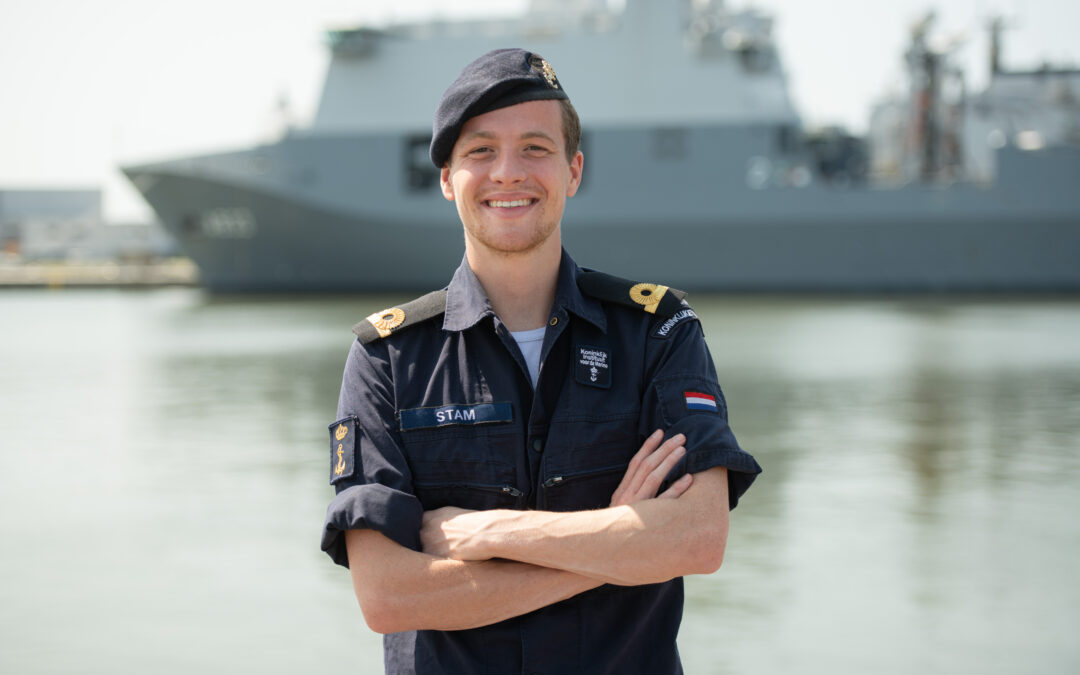Lt Noah Stam performed his BSc. dissertation at the NLDA on the topic of ballistic missile defence with a focus on intercepting ballistic missiles from a naval vessel. This research has earned him the Royal Netherlands Navy’s annual Van Hengel-Spengler Award.
Stam’s research – Parameters determining intercept capabilities – SM-3 versus various threat ranges – is inspired by a test from the US Missile Defence Agency and the US Navy in which Hawaii needed to be defended against an inter-continental ballistic missile. Based on opensource information, Noah Stam developed high-fidelity simulation models to recreate the test. The simulation models allow the Royal Netherlands Navy to perform ballistic missile defence smarter and improve its capabilities.
Other nominees
Niels Gartner performed his MSc. dissertation at the TU Delft on the topic of lithium-ion batteries in submarines: “Thermal behaviour of lithium-ion batteries and the implications for submarine system design”. Submarines face an ongoing battle to improve the operational effectiveness by increasing the submerged endurance and range. Installing lithium-ion batteries has become increasingly interesting based on their relatively high energy density.
However, lithium-ion batteries can develop a thermal runaway: a process which exponentially generates heat, leading to the risk of an explosion and fire. Using a thermal model of a lithium-ion battery module Niels has been able to give the Royal Netherlands Navy better insights in terms of module design, module optimisation and material selection for incorporating lithium-ion batteries in (future) submarines.
Lt. Niek van den Nieuwenhuijzen performed his MSc. dissertation at the TU Delft with research on the physical loads to which high speed marine craft crew are exposed: “Preventing injuries of high speed marine craft operators – Incorporating spinal injury models in the analyses of various seat suspension principles”.
As a result of the exposure to physical loads, the crew suffers from fatigue and injuries, leading to a reduced effectiveness and operational capacity of the marine craft. In an attempt to reduce the physical loads, passive shock mitigating seats can be installed. By developing a finite-element program and implementing injury risk models, the research allows the Royal Netherlands Navy to consider the influence of modifications on the resulting risk of injury with regards to a realistic operational profile. Therefore, the research reduces the necessity of complex sea and lab trials, which positively effects the costs and time in the design process.
Maritime RNLN Van Hengel-Spengler Award
To be eligible for the award, a student employed by the Royal Netherlands Navy (RNLN) must carry out research as part of his or her studies, the results of which lead to new insights, concepts or innovations that contribute to better operational deployment of naval units. The RNLN Van Hengel-Spengler Award is in keeping with the innovative nature of the RNLN and was first presented in 2013, when the navy celebrated its 525th anniversary. The winner was announced at the Maritime Awards Gala on 1 November in Rotterdam.
The award is named after two naval officers who, in the early twentieth century, laid the foundations for encrypting messages via a rotating machine. This idea gave rise to the famous German “Enigma” machine, which in turn led to efforts on the English side to break the encryption. The English scientist Alan Turing developed the concepts of a computer on this basis.
Also read: Better planning of amphibious operations wins Netherlands Navy award








